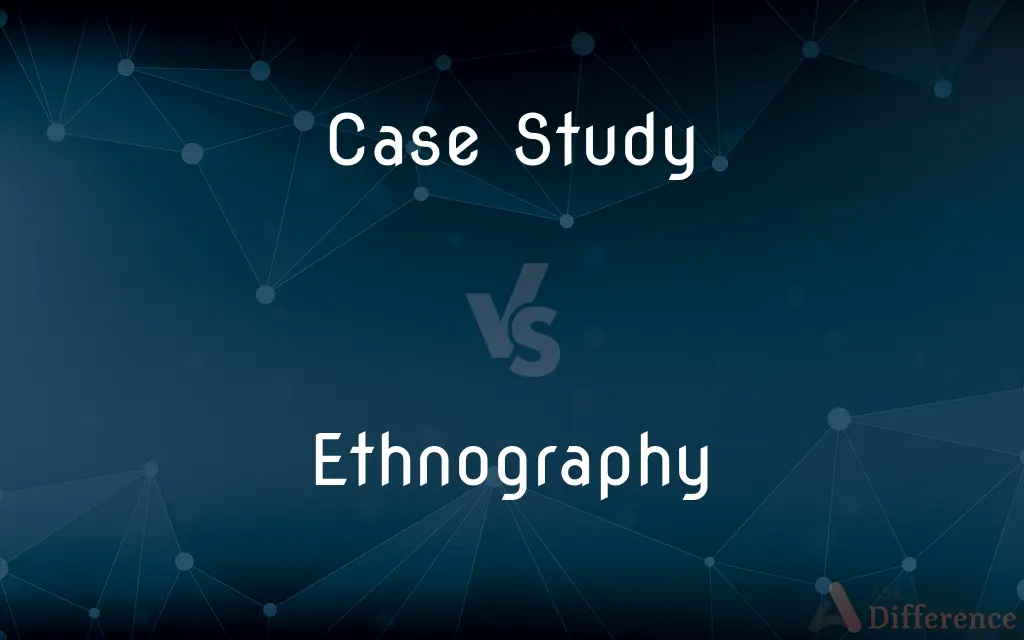Case Study vs. Ethnography — What's the Difference?
Edited by Tayyaba Rehman — By Fiza Rafique — Published on December 29, 2023
A Case Study is an in-depth examination of a specific subject or entity, while Ethnography is the qualitative study of cultures and people in their natural environments.

Difference Between Case Study and Ethnography
Table of Contents
ADVERTISEMENT
Key Differences
The Case Study approach focuses on a detailed investigation of a particular instance, event, or subject, often involving one individual, organization, or situation. On the other hand, Ethnography dives deep into understanding and interpreting cultural phenomena, typically by immersing oneself in the environment and lives of the people being studied.
In a Case Study, researchers aim to provide insights into the depth and complexities of a single, specific case, which can be used to understand broader issues or phenomena. In contrast, Ethnography requires ethnographers to embed themselves in the culture or community they're researching, often living with and observing the subjects for extended periods to grasp the intricacies of their daily lives and customs.
The goal of a Case Study often revolves around understanding the how and why of a particular situation, providing a comprehensive analysis based on data and observations. Ethnography, conversely, seeks to offer a rich, detailed account of cultural practices, beliefs, and behaviors, often written in a narrative form that captures the essence of a community's way of life.
Case Studies can be employed across various disciplines, including business, psychology, and education, to name a few. Ethnography, originating from anthropology, has now found applications in various fields like sociology, design, and user experience, emphasizing the importance of understanding human behaviors and cultural contexts.
Comparison Chart
Definition
In-depth study of a specific subject
Qualitative study of cultures in natural environments
ADVERTISEMENT
Focus
Specific individual, event, or situation
Entire culture or community
Methodology
Detailed analysis based on data and observations
Immersion and direct observation
Outcome
Insights into a particular case
Detailed account of cultural practices
Application Areas
Business, psychology, education, etc.
Anthropology, sociology, design, etc.
Compare with Definitions
Case Study
Case Studies can be descriptive or explanatory.
The Case Study described the events leading up to the merger.
Ethnography
Ethnography captures the essence of a community's lifestyle.
Her Ethnography painted a vivid picture of village life.
Case Study
Case Studies delve into the complexities of a particular subject.
The psychologist wrote a Case Study about the patient's unique condition.
Ethnography
Ethnography involves studying cultures through immersion.
The anthropologist's Ethnography of the tribe was enlightening.
Case Study
A Case Study is often based on real-life events or situations.
The Case Study focused on a start-up's journey over five years.
Ethnography
Ethnography requires in-depth, long-term observation.
For his Ethnography, he lived with the community for a year.
Case Study
A Case Study is a detailed investigation of a specific instance.
The company's success was analyzed in a Case Study.
Ethnography
Ethnography aims to understand and interpret human behaviors.
The Ethnography shed light on the community's unique customs.
Case Study
A Case Study aims to provide comprehensive insights.
The Case Study highlighted the challenges of implementing the new software.
Ethnography
The branch of anthropology that deals with the description of specific human cultures, using methods such as close observation and interviews.
Ethnography
A text produced using such methods.
Ethnography
(anthropology) The branch of anthropology that scientifically describes specific human cultures and societies.
Ethnography
An ethnographic work.
Ethnography
That branch of knowledge which has for its subject the characteristics of the human family, developing the details with which ethnology as a comparative science deals; descriptive ethnology. See Ethnology.
Ethnography
The branch of anthropology that provides scientific description of individual human societies
Ethnography
Ethnographers produce detailed accounts of cultural practices.
The Ethnography explored the region's ancient rituals.
Common Curiosities
How long does an Ethnography study typically last?
Ethnography studies can last from several months to several years, depending on the depth of immersion required.
What is the primary focus of a Case Study?
A Case Study focuses on an in-depth examination of a specific subject or entity.
Are Case Studies subjective?
Case Studies aim to be objective, but interpretation and analysis can introduce subjectivity.
What does Ethnography emphasize in its study?
Ethnography emphasizes understanding cultures and people in their natural environments.
Can a Case Study be based on fictional events?
While Case Studies typically focus on real-life events, fictionalized cases can be used for teaching or illustrative purposes.
Can a Case Study be applied to organizations?
Yes, a Case Study can be used to analyze specific aspects or challenges within an organization.
Is a Case Study quantitative or qualitative?
While Case Studies are primarily qualitative, they can also incorporate quantitative data.
Are ethnographers detached observers in their studies?
No, ethnographers often become deeply involved in the communities they study, participating in daily activities.
What's a common method used in Ethnography?
Participant observation, where the researcher immerses themselves in the community, is a common method in Ethnography.
What disciplines commonly use Case Studies?
Business, psychology, law, and education are some fields where Case Studies are prevalent.
What's a key outcome of Ethnography?
Ethnography produces a rich, narrative description of a culture's practices, beliefs, and behaviors.
Why is immersion important in Ethnography?
Immersion ensures ethnographers fully understand and accurately represent the culture or community they're studying.
Can the findings from one Case Study be generalized?
Case Study findings are specific to the case itself, but insights can be used to understand broader issues or phenomena.
Can a Case Study cover multiple subjects?
Typically, a Case Study focuses on one subject, but comparative case studies can examine multiple subjects simultaneously.
Is Ethnography limited to traditional cultures?
No, Ethnography can study any group or culture, including modern and urban communities.
Share Your Discovery

Previous Comparison
Plasma vs. Interstitial Fluid
Next Comparison
Annual General Meeting vs. Extraordinary General MeetingAuthor Spotlight
Written by
Fiza RafiqueFiza Rafique is a skilled content writer at AskDifference.com, where she meticulously refines and enhances written pieces. Drawing from her vast editorial expertise, Fiza ensures clarity, accuracy, and precision in every article. Passionate about language, she continually seeks to elevate the quality of content for readers worldwide.
Edited by
Tayyaba RehmanTayyaba Rehman is a distinguished writer, currently serving as a primary contributor to askdifference.com. As a researcher in semantics and etymology, Tayyaba's passion for the complexity of languages and their distinctions has found a perfect home on the platform. Tayyaba delves into the intricacies of language, distinguishing between commonly confused words and phrases, thereby providing clarity for readers worldwide.














































